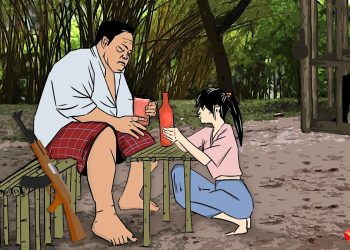RANGOON — The Kachin Baptist Convention (KBC) said it opposes efforts by Shan State police to interrogate two ethnic Kachin youths in Muse Township as it fears they could be wrongly accused of the murder of two female teachers last month.
KBC general-secretary Rev. Samson said police met with KBC leaders on Feb. 20 and asked the organization to cooperate with their plans to detain and question the young Kachin men—one aged 19 and another aged 20—who live in Kaung Kha village, where the murders took place.
“We are worried they will threaten the two boys and force them to confess to the killing. Therefore, we did not agree to let them do it. We will let them do it only if they do it [questioning] in public,” he said.
KBC has been closely involved with local communities and authorities following the Jan. 20 killings of the two young women, who had been working for KBC as primary school teachers.
Col. San Lwin, who heads Taunggyi Police Station, told The Irrawaddy that the youths would not be detained but only questioned. “Based on the information they provided for our investigation, we found that we need to have more testimony from the two of them. This is why we asked KBC for it.
“We have not decided yet whether the two youths are involved in this case,” he added.
KBC and the wider Kachin community have voiced concern over the lack of a fair and independent investigation into the killings, which they believe are linked to members of the Burma Army’s Light Infantry Battalion 503 that was sent to the area shortly before the murders.
The army remains powerful in Burma and has been accused in the past of influencing local authorities and the judicial system in order to cover up crimes by its soldiers against ethnic minority civilians.
Earlier this month, the investigation, which is being carried out by a joint team of police, township authorities and members of the Burma Army, produced a group of suspects comprising both civilian villagers and soldiers. Results of post-mortem medical examinations on the victims and potential matches from DNA samples taken from the suspects have not been disclosed.
Home Affairs Minister Lt-Gen. Ko Ko said earlier this month that DNA samples were collected from 45 villagers and 28 Burma Army soldiers. He told state television that two ethnic Kachin villagers were implicated in the crimes and had fled to Kachin rebel-controlled territory. The claim was met with concern by Kachin leaders, who fear he might have been influencing the investigation.
Samson said police had told KBC that the results of the investigation would be released soon, but he added that the group was worried that the investigation would be fixed in order let possible army suspects walk free. “The DNA research should meet high standards. If we don’t see the results we hope for we will ask other people to carry out another investigation,” he said.
San Lwin, of Taunggyi Police Station, said DNA tests were collected from 20 soldiers and eight local villagers and being analyzed. He said KBC should not worry about police arresting civilians to become scapegoats, adding, “Unless we have strong evidence, our police will not decide to arrest anyone for involvement in the crime.”
On Jan. 28, a military-owned newspaper announced that the army was not involved in the murders, and that claims of military involvement made after the results of the investigation were disclosed would be subject to legal action.

















